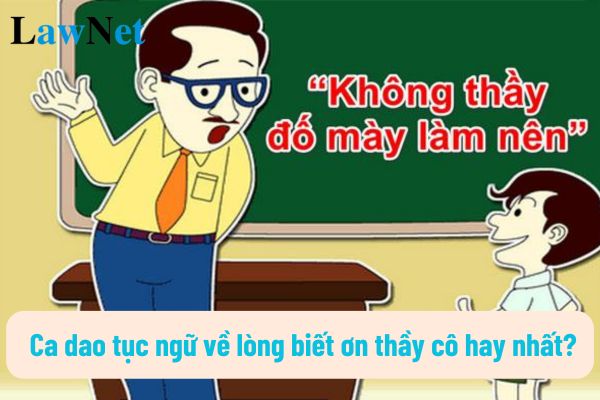Vietnam: What are folks and proverbs about gratitude towards teachers? What is the grade at which students begin learning folks and proverbs?
What are folks and proverbs about gratitude towards teachers in Vietnam?
Folks and proverbs about gratitude towards teachers are concise, folkloric phrases that reflect the deep respect and appreciation of students for their teachers. These folks and proverbs have been passed down from generation to generation, becoming an indispensable part of Vietnamese culture.
|
The Best Proverbs About Gratitude Towards Teachers |
*Note: Information on folks and proverbs about gratitude towards teachers in Vietnam is for reference only./.

What are folks and proverbs about gratitude towards teachers? What is the grade at which students in Vietnam begin learning folks and proverbs? (Image from the Internet)
What is the grade at which students in Vietnam begin learning folks and proverbs?
According to Section 5 of the General Education Program for Literature issued under Circular 32/2018/TT-BGDDT, the text corpus for the Grade-4 Curriculum is specified as follows:
- Literary Texts
+ Folk tales, short stories; description essays
+ Poems, rhymes, proverbs, folks
+ Scripts
+ Text length: stories, scripts about 280 - 330 words, description essays about 200 - 250 words, poems about 100 - 120 words
- Informational Texts
+ Instructions for performing a task or using a product
+ Invitations
+ Letters of inquiry, thank you notes, apologies
+ Applications (leave of absence, enrollment applications)
+ Progress reports
+ Text length: approximately 150 - 180 words
- Suggested Text Selection: refer to the list of suggestions
Thus, Proverbs about gratitude towards teachers are introduced starting in the Grade 4 curriculum.
What are the specific competencies required for the Grade-4 Curriculum in Vietnam?
Under Section 4 of the General Education Program for Literature issued under Circular 32/2018/TT-BGDDT, specific competencies required for the Grade-4 Curriculum in Vietnam are as follows:
- Regarding language competency:
+ Read accurately, fluently, and expressively; understand the main content of the text, mainly explicit content; begin to understand implicit content like the theme or lesson derived from the text read.
+ Understand specific content, grasp the theme, and comprehend lessons derived from the text.
+ Write complete short essays, mainly narratives, descriptions, and simple introductions.
+ Write narratives recounting stories read, experiences witnessed or participated in, and imagined stories; describe familiar objects and phenomena; introduce objects and activities close to students’ lives.
+ Write paragraphs expressing emotions, and thoughts when reading a story, poem, or witnessing an event evoking emotions; state opinions on a simple study and life issue; write various text forms such as autobiographies, messages, invitations, schedules, applications, etc.; start writing systematically; the text should include three parts (introduction, body, conclusion).
+ Present ideas and emotions understandably; begin to use appropriate gestures and movements when speaking; clearly retell a story read or heard; share and discuss thoughts and feelings on topics being discussed; explain a subject or simple process.
+ Listen with an appropriate attitude, grasp the basic content; recognize the speaker’s emotions; know how to respond to what they’ve heard.
- Literary Competency:
+ Differentiate between narrative and poetic texts (prose vs. verse); recognize text content and the writer’s attitude and feelings; begin to understand the effect of some literary form elements (language, character, plot, rhyme, simile, personification). Utilize associations, imagination, and literary expression in writing and speaking.
+ Know how to perform literary texts expressively; summarize the main content of stories, poems; assess characters, events, and the writer’s attitude and feelings in the text.
+ Identify time and place, some poetic rhymes, rhythms, beautiful, unique words, images, and the effect of rhetorical figures like personification, and comparison. Understand the meaning or lesson derived from the text. Write storytelling or descriptive essays that express emotions and imagination.
Download to view the detailed General Education Program in Literature.

